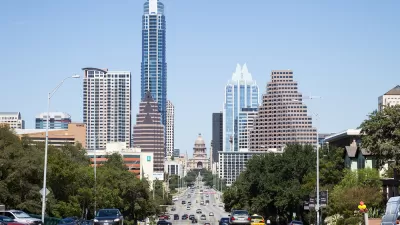The Texas capital’s new parking law signals a shift in thinking about the relationship between land use, transportation, and housing affordability.

Parking reform’s steady march may have reached a tipping point as Austin became the latest city—and one of the largest—to remove parking requirements citywide. As Kea Wilson writes in Streetsblog, the decision acknowledges parking’s role in perpetuating sprawl and driving up housing costs and is part of the city’s effort to stimulate enough housing production to accommodate its rapidly growing population.
Wilson notes that “Eliminating parking minimums alone, of course, won’t erase car dependency in Austin — and it may not dramatically slow the pace at which developers are building car storage.” But promoting denser development with less parking and more access to transit could increase affordability and help the city reach its goal to get half of the population commuting by transit or other non-car modes within the next two decades.
Read more about this hot topic at the parking reform tag.
FULL STORY: Every Growing City Should Heed Austin’s New Parking Law

Study: Maui’s Plan to Convert Vacation Rentals to Long-Term Housing Could Cause Nearly $1 Billion Economic Loss
The plan would reduce visitor accommodation by 25,% resulting in 1,900 jobs lost.

North Texas Transit Leaders Tout Benefits of TOD for Growing Region
At a summit focused on transit-oriented development, policymakers discussed how North Texas’ expanded light rail system can serve as a tool for economic growth.

Why Should We Subsidize Public Transportation?
Many public transit agencies face financial stress due to rising costs, declining fare revenue, and declining subsidies. Transit advocates must provide a strong business case for increasing public transit funding.

How to Make US Trains Faster
Changes to boarding platforms and a switch to electric trains could improve U.S. passenger rail service without the added cost of high-speed rail.

Columbia’s Revitalized ‘Loop’ Is a Hub for Local Entrepreneurs
A focus on small businesses is helping a commercial corridor in Columbia, Missouri thrive.

Invasive Insect Threatens Minnesota’s Ash Forests
The Emerald Ash Borer is a rapidly spreading invasive pest threatening Minnesota’s ash trees, and homeowners are encouraged to plant diverse replacement species, avoid moving ash firewood, and monitor for signs of infestation.
Urban Design for Planners 1: Software Tools
This six-course series explores essential urban design concepts using open source software and equips planners with the tools they need to participate fully in the urban design process.
Planning for Universal Design
Learn the tools for implementing Universal Design in planning regulations.
City of Santa Clarita
Ascent Environmental
Institute for Housing and Urban Development Studies (IHS)
City of Grandview
Harvard GSD Executive Education
Toledo-Lucas County Plan Commissions
Salt Lake City
NYU Wagner Graduate School of Public Service





























